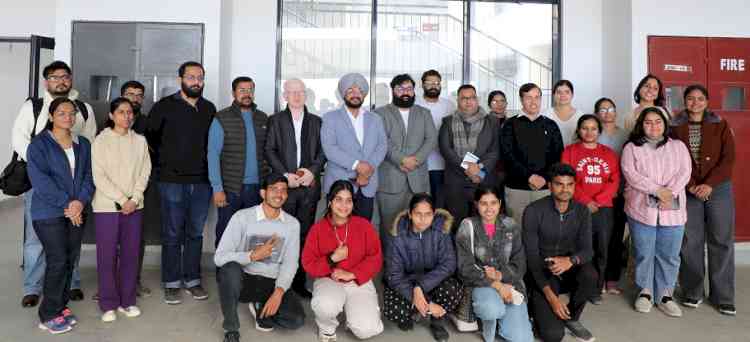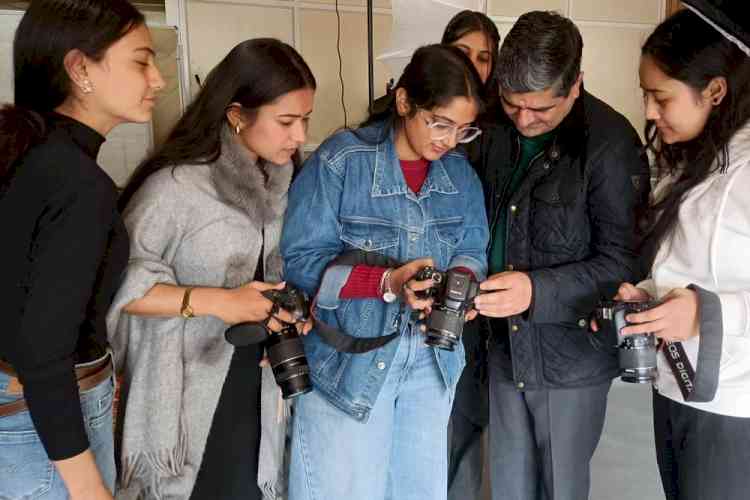ISADP Conference begins at PAU
A noted economist Dr RS Ghuman, Professor of Eminence, Guru Nanak Dev University, Amritsar, called for focusing on rural diversification with specific emphasis on agricultural diversification. He was delivering his keynote address on the topic “Prospectus of Rural Development in Punjab: Issues and Way Forward” at the inauguration of the two-day Virtual Annual Conference of the Indian Society of Agricultural Development and Policy (ISADP) on the “Pathways to Sustainable Agricultural Development.” The virtual conference has been organised by the Department of Economics and Sociology, Punjab Agricultural University (PAU).

Ludhiana, November 30, 2023: A noted economist Dr RS Ghuman, Professor of Eminence, Guru Nanak Dev University, Amritsar, called for focusing on rural diversification with specific emphasis on agricultural diversification. He was delivering his keynote address on the topic “Prospectus of Rural Development in Punjab: Issues and Way Forward” at the inauguration of the two-day Virtual Annual Conference of the Indian Society of Agricultural Development and Policy (ISADP) on the “Pathways to Sustainable Agricultural Development.” The virtual conference has been organised by the Department of Economics and Sociology, Punjab Agricultural University (PAU).
“About 60-65 per cent of rural households are landless in Punjab. Besides, a cultivator is earning 78 per cent of farm income and 22 per cent of non-farm income,” he disclosed. Since the yield has reached a plateau, the development of non-farm sector and Micro, Small and Medium Enterprises (MSMEs) was vital for accelerating the rural economy, he stressed. With 70 per cent of Punjab based in rural areas and 90 per cent of rural households (labourers) not having a single matriculate in their families, there was a need to diversify rural economy, he said. Expressing concern over the challenges of severe air pollution and water crisis, Dr Ghuman lamented that Punjab’s economy was no longer ‘agrarian.’ He cited the example of South India where paddy was being cultivated but no stubble burning was taking place. As a result of wheat-paddy cropping pattern, about 80 per cent of virtual water was being transported to the Central pool, he divulged. Further, Dr Ghuman bemoaned that Punjab’s rural development has never focused on sustainable policy and that whatever has been done was just a crux of rural development. Politicians lacked political will and were busy in raising freebies without addressing fundamental issues, he added. “We have spent billions and billions on rural development. But where have they gone? Have they been washed away by rains?” he pointed out, while referring to unfavourable investment climate. Raising the issue of lack of capital investment, he underlined the need for mobilization of resources. Dr Ghuman made a call for rural development that covered social as well as economic sustainability.
Another eminent economist Dr HS Bhatti, Professor of Sociology, Punjabi University, Patiala, while speaking on the topic “Three Paradigms of Environmental Crisis and Sustainability,” emphasised on human development instead of exploitation of human resources. Referring to three paradigms, firstly he explained ‘Contest perspective’ where there was a contest between rich and poor as well as human development and material development in various countries. Secondly, he talked about ‘Astronaut perspective’ that aimed at studying everything on space regarding water and rain. Thirdly, he referred to ‘Home perspective’ where humans knew nature and nature knew man very well. “Village people, being ecosystem-based, were completely dependent on eco-system for their survival, whereas we are ecological refugees; urban development is taking place but we are dependent on ecosystem to some extent,” he said. About human development, he observed that the nuclear families were totally dysfunctional and producing dysfunctional human beings. Revealing that 10 per cent of Punjab’s population had migrated to villages, Dr Bhatti observed: “Nature has enough for our needs, but not for greed.” Dr Bhatti concluded with the remarks: “Economy of permanence is important; develop the underdeveloped societies, and stop the dominance, exploitation and misuse of nature.”
Dr JM Singh, President of ISADP and Head, Department of Economics and Sociology, underscored the need for bringing in technological innovations and investment for sustaining agriculture. Ignoring the role of climate, biodiversity and conservation could block the road to sustainable development, he warned.
Dr Arjinder Kaur, General Secretary of ISADP, emphasized on addressing the issues of gender inequality, high unemployment and rising suicides to restore the planetary health and rejuvenate the society. Informing that 60 research papers have been received for the conference, she said that the researchers were more concerned with empowering rural communities and conserving their livelihood.
Dr Shalini Sharma, Treasurer of ISADP, welcomed the keynote speakers and the economists from Punjab, Haryana, Gujarat, Rajasthan, Odisha, Uttar Pradesh, Bihar, Jammu, Tamil Nadu and Kerala.
Dr Sanjay Kumar, Vice-President of ISADP, proposed a vote of thanks.
Economist Dr Atinder Pal Kaur, while conducting the programme, observed that commercialization had also invaded rural life and that it was important to chalk out a path for making the livelihood more sustainable.



 City Air News
City Air News 










